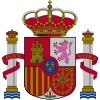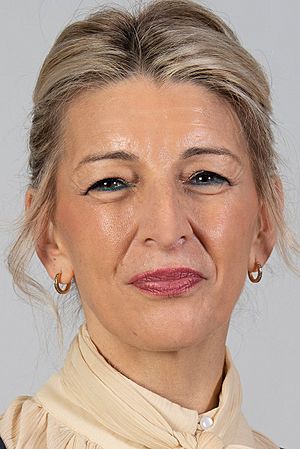Second Deputy Prime Minister of Spain facts for kids
Quick facts for kids Second Deputy Prime Minister of Spain |
|
|---|---|

|
|
| Government of Spain Council of Ministers |
|
| Style | Excelentísimo/a Señor/a |
| Member of | Cabinet |
| Residence | Palacio de la Moncloa |
| Seat | Madrid, Spain |
| Nominator | Prime Minister |
| Appointer | Monarch Countersigned by the Prime Minister of Spain |
| Term length | No fixed term
No term limits are imposed on the office.
|
| Constituting instrument | Organic Act of the State of 1967 (original) Constitution of 1978 (current) |
| Formation | 3 January 1974 |
| First holder | Antonio Barrera de Irimo |
The second deputy prime minister of Spain, officially Second Vice President of the Government of Spain (Spanish: Vicepresidencia Segunda del Gobierno de España), is a senior member of the Government of Spain. The office of the Second Deputy Prime Minister is defined in the Constitution but is not a permanent position, existing only at the discretion of the Prime Minister.
The current second deputy prime minister is Yolanda Díaz, who is also minister of Labour and Social Economy.
Contents
History
The office was established by the Organic Act of the State of 1967 which allowed for the creation of a Council of Ministers composed of the Prime Minister, one or more Deputy Prime Ministers and the Ministers. However, it was not until 1974, one year after the dictator Francisco Franco split the office of head of government (prime minister) and head of state, that prime minister Arias Navarro appointed Antonio Barrera Irimo, Minister of Finance as second deputy prime minister.
In Arias Navarro's second term, the Finance Minister Rafael Cabello de Alba was also appointed second deputy prime minister in October 1974. During his third term, Arias Navarro appointed Minister of the Interior Manuel Fraga as second deputy prime minister.
Prime minister Adolfo Suárez appointed his Interior Minister, Alfonso Osorio García and Minister of the Presidency as second deputy prime minister. From 1977 to 1981, Suárez appointed his Finance Ministers as Second Deputies and during his short term, Calvo-Sotelo did the same.
Socialist PM González never appointed a second deputy prime minister during his almost 14 years of premiership. José María Aznar and José Luis Rodríguez Zapatero however followed the previous pattern of appointing their Finance Minister as second deputy prime minister. However, a cabinet reshuffle in 2011 appointed the Minister of Territorial Policy and Civil Service, Manuel Chaves as second deputy prime minister.
The conservative PM Mariano Rajoy did not appoint a second deputy prime minister. The subsequent prime minister Pedro Sánchez did not appoint in second deputy prime minister in his first government, but he did in his second term. In March 2021, after the resignation of Pablo Iglesias as second deputy prime minister, the tradition of appointing a minister of economic affairs as second deputy PM was resumed. In July 2021, Labour and Social Economy Minister Yolanda Díaz was appointed as second deputy PM.
Powers
The office of second deputy prime minister does not possess special constitutional powers beyond its responsibility as a member of the Council of Ministers. The position is regulated in the Government Act of 1997 and it only specifies that the raison d'être of the office is to replace the Prime Minister when the office is vacant, or the premier is absent or ill. The second deputy prime minister only assumes this responsibility if the first deputy is unable to fill the role.
List of officeholders
Office name:
- Second Vice Presidency of the Government (1974–1975; 1977–1979; 1981–1982; 1996–2000; 2003–2011; 2020–present)
- Vice Presidency of the Government for Interior Affairs (1975–1976)
- Second Vice Presidency of the Government, in charge of the Coordination of the Economic Affairs (1979–1981)
- Second Vice Presidency of the Government for Economic Affairs (2000–2003)
- Vice Presidency of the Government for Territorial Policy (2011)
| Portrait | Name (Birth–Death) |
Term of office | Party | Government | Prime Minister (Tenure) |
Ref. | ||||
|---|---|---|---|---|---|---|---|---|---|---|
| Took office | Left office | Duration | ||||||||
 |
Antonio Barrera de Irimo (1929–2014) |
4 January 1974 |
30 October 1974 |
299 days | National Movement (Nonpartisan) |
Arias Navarro I | Carlos Arias Navarro (1973–1976) |
|||
 |
Rafael Cabello de Alba (1925–2010) |
30 October 1974 |
12 December 1975 |
1 year and 43 days | National Movement (Nonpartisan) |
|||||
 |
Manuel Fraga (1922–2012) |
12 December 1975 |
5 July 1976 |
206 days | National Movement (FEDISA) |
Arias Navarro II | ||||
 |
Alfonso Osorio (1923–2018) |
8 July 1976 |
5 July 1977 |
362 days | National Movement (UDE) |
Suárez I | Adolfo Suárez (1976–1981) |
|||
 |
Enrique Fuentes Quintana (1924–2007) |
5 July 1977 |
25 February 1978 |
293 days | Independent | Suárez II | ||||
 |
Fernando Abril Martorell (1936–1998) |
25 February 1978 |
6 April 1979 |
2 years and 197 days | UCD | |||||
| 6 April 1979 |
9 September 1980 |
Suárez III | ||||||||
 |
Leopoldo Calvo-Sotelo (1926–2008) |
9 September 1980 |
27 February 1981 |
171 days | UCD | |||||
| Office disestablished during this interval. | ||||||||||
 |
Juan Antonio García Díez (1940–1998) |
2 December 1981 |
30 July 1982 |
240 days | UCD | Calvo-Sotelo | Leopoldo Calvo-Sotelo (1981–1982) |
|||
| Office disestablished during this interval. | ||||||||||
 |
Rodrigo Rato (born 1949) |
6 May 1996 |
28 April 2000 |
7 years and 121 days | PP | Aznar I | José María Aznar (1996–2004) |
|||
| 28 April 2000 |
4 September 2003 |
Aznar II | ||||||||
 |
Javier Arenas (born 1957) |
4 September 2003 |
18 April 2004 |
227 days | PP | |||||
 |
Pedro Solbes (1942–2023) |
18 April 2004 |
14 April 2008 |
4 years and 354 days | Independent | Zapatero I | José Luis Rodríguez Zapatero  (2004–2011) |
|||
| 14 April 2008 |
7 April 2009 |
Zapatero II | ||||||||
 |
Elena Salgado (born 1949) |
7 April 2009 |
12 July 2011 |
2 years and 96 days | Independent | |||||
 |
Manuel Chaves (born 1945) |
12 July 2011 |
22 December 2011 |
163 days | PSOE | |||||
| Office disestablished during this interval. | ||||||||||
 |
Pablo Iglesias (born 1978) |
13 January 2020 |
31 March 2021 |
1 year and 77 days | Podemos | Sánchez II | Pedro Sánchez (2018–present) |
|||
 |
Nadia Calviño (born 1968) |
31 March 2021 |
12 July 2021 |
103 days | Independent | |||||
 |
Yolanda Díaz (born 1971) |
12 July 2021 |
21 November 2023 |
3 years and 288 days | PCE | |||||
| SMR, PCE | ||||||||||
| 21 November 2023 |
Incumbent | Sánchez III | ||||||||
See also
 In Spanish: Anexo:Vicepresidente segundo del Gobierno de España para niños
In Spanish: Anexo:Vicepresidente segundo del Gobierno de España para niños


